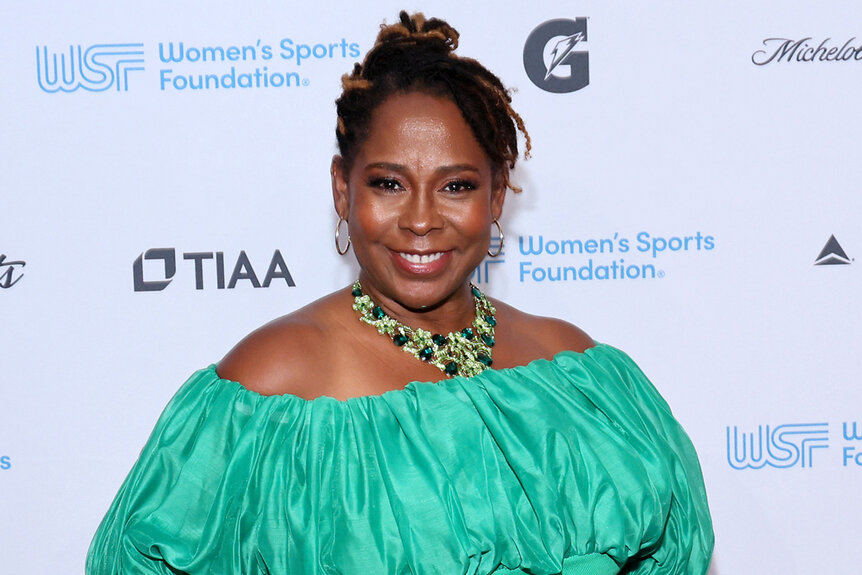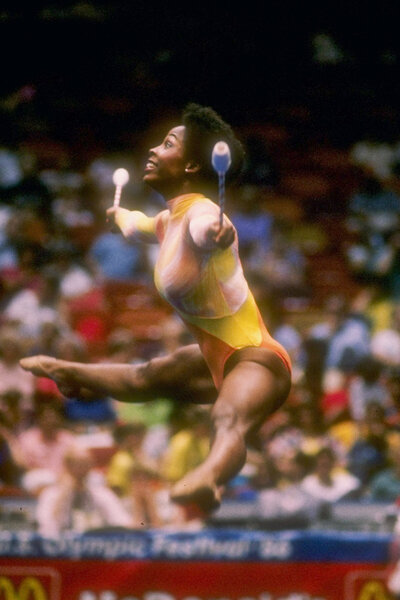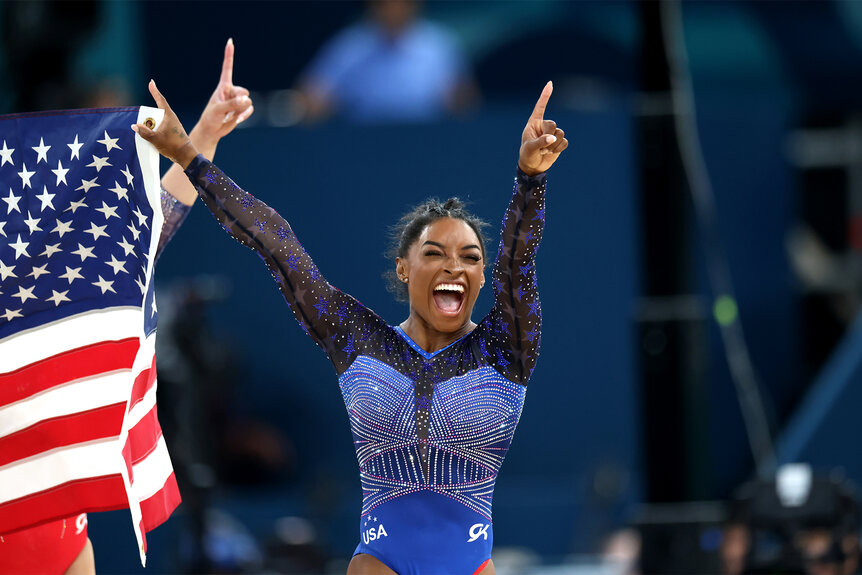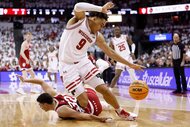Hall of Fame Gymnast Wendy Hilliard Celebrates Simone Biles' Olympic Success: "Remarkable"
Since 1996, the trailblazing, perennial youth advocate and beacon of sportsmanship has provided low-cost gymnastics to more than 27,000 kids in underserved communities.
For Wendy Hilliard, life’s always been about firsts.
Hailing from Detroit, Michigan, Hilliard was the first African-American to compete for Team USA in international competition in rhythmic gymnastics, including a trifecta of impactful World Championships (1979, 1981 and 1983). From 1995 to 1996, Hilliard served as the first Black president of the Women’s Sports Foundation, an educational charity founded by the legendary tennis champion and humanitarian Billie Jean King that strives to empower females in sports. Sprinkle in years of extensive coaching experience at the elite level, journalistic contributions for CNN, sportscasting commentary for NBC Sports, and a cameo in the 1997 Broadway production Candide, and the question then becomes not what has Hilliard accomplished in such a short amount time, but what hasn’t she done?
Still, for Hilliard, who saw the expenses of her beloved sport of gymnastics as prohibitive to many underserved and low-income communities across America, her greatest contributions to both her sport and society derive from her dedication to her non-profit, the Wendy Hilliard Gymnastics Foundation — the first organization founded by a Black leader to produce national and international champions in two gymnastics disciplines, rhythmic and tumbling.
RELATED: What Happened to Jordan Chiles’ Olympic Bronze Medal in Floor Exercise?
What is the Wendy Hilliard Gymnastics Foundation?
Founded in 1996, the Wendy Hilliard Gymnastics Foundation (WHGF) focuses on making the sport of gymnastics accessible to all, especially disadvantaged youth who come from low-income families that historically don’t have the financial resources to pursue a sport like gymnastics.
“I started the foundation because I really wanted kids to have access to gymnastics... And really, what we do is we offer free and low cost gymnastics,” details Hilliard exclusively to NBC Insider. “You have to dedicate a lot of time and effort, and it's usually folks that have more disposable income. So, what I do is I partner with people to give us a space, and I raise a lot of money so I can make good classes as inexpensive as possible. But then on top of that, you get scholarships, so anybody who comes to our organization can take gymnastics.”
But we’re not talking about any average, run-of-the-mill somersaults and cartwheels. The caliber of instruction the youth athletes receive at either of the two locations — Harlem and Detroit — is unparalleled. Since its inception, the organization has produced phenomenal talents such as BJ Mensah, who competed in tumbling at the World Age Group Championships in Azerbaijan in 2021; ZaQuae Carter, who finished runner-up in the junior division in tumbling during the USA Gymnastics Championships; and Alexis Page, who was a three-time U.S. Rhythmic Gymnast National Team member and International Gold Medalist before becoming the head coach for the foundation.
And as Hilliard explains, her foundation’s involvement doesn’t just stop once it’s introduced a youngster to the sport — it’s in it for the long run.
“We support them all the way,” continues Hilliard. “What happens in gymnastics is, once you like it, and you get hooked, and you have to practice more, the cost goes up, like you have to travel all weekend …So, we support the kids.”
More than that, the foundation aims to instill in the participant's a good work ethic. "And that's the biggest thing that I want to provide the kids that I work with. I want them to [have a] good work ethic, [and] I want you to be confident," she says.
RELATED: See the Epic Steph Curry TikTok Jimmy Fallon Captured Before Team USA's Olympics Win
Creating an Elite Gymnast
As a member of the U.S. Rhythmic Gymnastics National Team a record-setting nine times, including serving twice as the National Team captain, Wendy Hilliard knows a thing or two about what it takes to be an elite level gymnast. But aside from the obvious physiological element and carefully cultivated musculature she sees in veteran gymnasts like four-time Olympic gold medalist Simone Biles, whom she remains very close with, Hilliard, who was on hand in Minneapolis, Minnesota for the U.S. Olympic Team Trials, says that when it comes to the cream of the crop, the devil’s in the details.
“Gymnastics is very particular,” notes Hilliard. “It's like music. It's all these little details. To do it well, you have to have an appreciation for the minute details, and you have to practice it over and over you. You have to like repetition. You have to have a certain level of excellence, meaning that high expectations for yourself to want to achieve good things, right? Because it takes a lot of work… You have to be born with a certain level of determination. You really do.”
Talent, Hilliard says, is a crucial ingredient, but that’s not the ultimate determining factor for success, especially with the kids she coaches through her foundation.
“We see a lot of kids with talent, but… If it's between a kid that's very talented and another kid that will work really hard, we'll take the kid that works very hard because in the end, they're going to be the ones that are most successful,” reveals Hilliard.
“You have to be able to take direction and apply it. And if you can do that, you're going to do that in school. You're going to do that at work. I don't think people appreciate how good it is when you have kids that can follow directions, that can listen to you and then implement it," she continues.
“Talent only comes in like third or fourth on the list, it really does.”
The moment Wendy Hilliard realized she had made it
Hilliard also reflected on the moment she realized that her dreams of becoming an elite gymnast were obtainable and not just lofty goals.
“That is such a great question,” reflects Hilliard with a smile. “You know, I don't know if it happened at one point. I think it's kind of the point, maybe about the second or third year you make a national team, and what happens is, you know how to get there. The first year, you’re super excited, ‘Oh, I'm the top.’ In the second year, it's like, ‘Oh, it wasn't a fluke.’ And then you start getting to the point where you know how to do it. …You know your capacity, you know when you make a mistake and how to come back.”
She decides, “We worked so hard, but I would say probably making the national team or the World Championship team the first or second time.”
RELATED: Noah Lyles Opens Up on COVID Diagnosis, His Top Paris Memory, and What's Next
How did Simone Biles overcome the “twisties?”
Having been such a mainstay fixture in gymnastics for so long, Wendy Hilliard’s developed meaningful relationships with several elite gymnasts like Gabby Douglas and Simone Biles, giving her unique insight into how Biles was able to bounce back from a bout of the “twisties” that forced her to withdraw from the 2020 Tokyo Games.
“You know each person is different, because, like you said, it's a mental thing that happens, and it comes from a lot of different things, and sometimes you don't know what it is,” notes Hilliard. “But I watched [Simone in Tokyo] with a lot of gymnasts, and we knew exactly what it was... We knew it wasn't like a mistake. We saw her eyes. We're like, ‘Oh, she’s lost,’ and Simone doesn't get lost.”
“So, she had to take a break… Because it's a mental thing, it's not just physical… And people don't realize,” continues Hilliard. “Talk about how amazing she is, even in the same Olympics, she went back to compete on beam and took out all of her twisting elements, and still got a medal. I mean, that is the remarkable stuff.”
Hilliard not only applauds Biles for what she was able to accomplish in Japan but also everything the superstar has done since then to normalize the conversation around mental health struggles in gymnastics and sports in general.
“[Biles] has done such a great service to everyone, to let people realize how important mental health is,” says Hilliard. “You train so hard so that when you get to the big stage, when you have the Olympics or World Championships, your body has to be on autopilot because your mind has to be set. So that's why you train so hard.”
“And if people look at Simone, that's really the other part of her greatness,” adds Hilliard. “Half the time when I watch her compete, I just look at her eyes, and she's so relaxed, and she's so zoned in. For me, it's amazing to see that kind of mastery of her gymnastics. …That’s almost as incredible as the tricks that she's doing.”





















